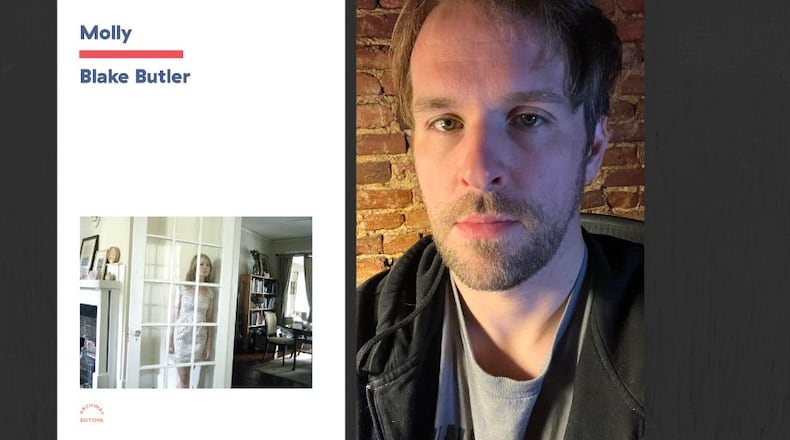Poet Molly Brodak made her nonfiction literary debut in 2016 with “Bandit,” a memoir about her chaotic childhood growing up with a bipolar mother and a father who robbed banks.
At the time, she was teaching English at Kennesaw State University and engaged to her future husband, novelist Blake Butler, author of “Alice Knott” and “Three Hundred Million.” She had a blossoming side gig, too, producing exquisite cakes that looked like works of art for her company Kookie House.
From the outside looking in, Brodak seemed to have it all. But less than four years later, she was dead from a self-inflicted gunshot wound.
In his raw, new memoir “Molly,” (Archway Editions, $17.95), Butler recounts his relationship with Brodak in astonishing detail and paints an unvarnished portrait of a very troubled woman who appears to have been equal parts brilliant, beautiful and deceitful. And in the process, he draws a line connecting her emotional instability to the generations of trauma passed down through her family.
In his trademark maximalist prose, Butler chronicles the progression of the couple’s relationship from first date to tragic end and beyond. It’s the beyond, though, that casts much of what comes before it in a different light. Just days after Brodak’s death, Butler discovered disturbing secrets about his wife that made him question whether he knew her at all. Witnessing Butler come to terms with this new knowledge and still end up in a place of unconditional love reads like an act of grace on the page.
“(N)o matter what a person is or was or does, however damaged or deluded we might be, how pat it sounds: Nothing but love can shift the cycle,” he writes. “Nothing but love remains for long.”
There are two sides to every marriage, and “Molly” obviously presents only one. But Butler doesn’t make himself out to be a saint. He confesses to drinking until blacking out and “acting a fool” in bars. While he and Brodak are dating, he sees other women on the side. He has frequent outbursts of anger, particularly in the form of road rage.
But it’s what Butler doesn’t say that is perhaps more revealing.
According to Butler, Brodak put work above all else but was extraordinarily insecure about her talent and often crippled by imposter syndrome. And yet, “Molly” seems to skirt over significant events in Brodak’s literary career. Butler uses quotes from “Bandit” to tell his story but its publication and the attention it garnered barely gets a mention.
Speaking about her imposter syndrome midway through the memoir, Butler mentions that Brodak’s last three manuscripts at that point in time had failed to find a publisher, but he doesn’t address how damaging that kind of rejection can be for an author.
Butler does acknowledge Brodak’s deep disappointment over the “Great American Baking Show” debacle, though, and rightly so. After jumping through a million hoops, she landed a spot on the televised baking competition and made it to the finals, but only one episode aired before sexual misconduct charges against a judge resulted in the show being scrapped. It was a demoralizing turn of events, and Brodak took it hard, faulting herself for even trying.
Despite tremendous talent and a promising start, Brodak’s creative aspirations were falling short of her expectations, and for someone who was already too hard on herself, it must have been a lot to bear. Not long before she died, she learned that publishers had passed on her fourth manuscript.
“Molly” is a dark, gorgeously crafted read. It contains a tremendous amount of pain, and the loss of life, loss of potential, loss of what could have been weighs heavy. That Butler makes it out the other side whole enough to tell this story is the glimmer of hope that sustains the reader in the end.
“I got to share a life up close with one of the most brilliant and singularly stunning people I’ve ever met, good times and bad,” Butler writes. “I got to walk beside her and support her as best I could, as best she’d let me; to offer love where love had so long been denied. I don’t regret it, never will, no matter how much pain it’s caused me, all the mental damage.”
Writers at the Wrecking Bar presents Butler in conversation with Hugh Crawford, associate professor of literature at Georgia Tech, 7 p.m. Dec. 14 at The Marianna Room upstairs at the Wrecking Bar Brewpub. Presented by A Cappella Books. For details go to www.acappellabooks.com.
Suzanne Van Atten is book critic and contributing editor to The Atlanta Journal-Constitution. You can contact her at suzanne.vanatten@ajc.com.
About the Author
Keep Reading
The Latest
Featured


